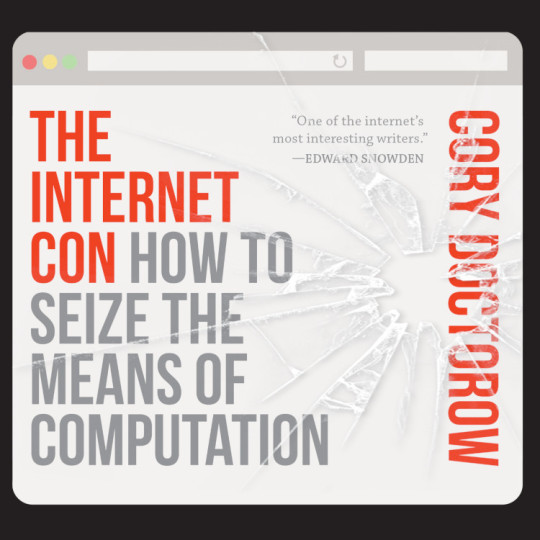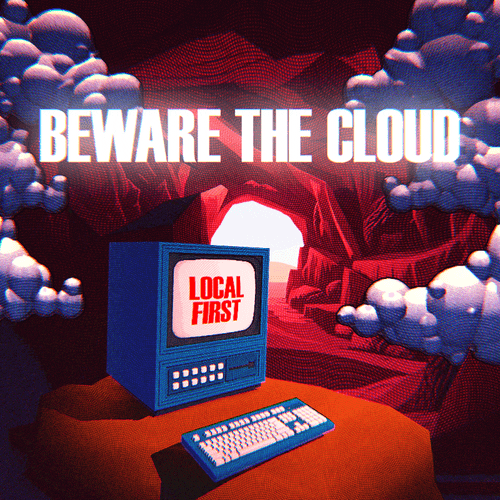#local cloud
Text
we all know and love the "Athena children have severe arachnophobia" but you know what we don't think about Enough? " Apollo children have severe ophidiophonia (yes I looked it up[yes it's the fear of snakes]), like I think it could be such a good trope and so underrated
#percy jackson#percy jackon and the olympians#pjo#local cloud#Rambling#Underrated trope#cabin 7#apollo kids#cabin 6#Athena kids#athena cabin#apollo cabin#I have seen exactly#Two fics#With that trope#And they were awesome
159 notes
·
View notes
Text


A promise to cut down even the stars in the sky.
#liubai#jingliu#baiheng#high cloud quintet#honkai star rail#honkai star rail fanart#hsr#this is a closer approximation to the original chinese than what they actually localized it as#i uploaded the wrong version of the file to twitter im still crying
512 notes
·
View notes
Text
Cloudburst

Enshittification isn’t inevitable: under different conditions and constraints, the old, good internet could have given way to a new, good internet. Enshittification is the result of specific policy choices: encouraging monopolies; enabling high-speed, digital shell games; and blocking interoperability.
First we allowed companies to buy up their competitors. Google is the shining example here: having made one good product (search), they then fielded an essentially unbroken string of in-house flops, but it didn’t matter, because they were able to buy their way to glory: video, mobile, ad-tech, server management, docs, navigation…They’re not Willy Wonka’s idea factory, they’re Rich Uncle Pennybags, making up for their lack of invention by buying out everyone else:
https://locusmag.com/2022/03/cory-doctorow-vertically-challenged/
But this acquisition-fueled growth isn’t unique to tech. Every administration since Reagan (but not Biden! more on this later) has chipped away at antitrust enforcement, so that every sector has undergone an orgy of mergers, from athletic shoes to sea freight, eyeglasses to pro wrestling:
https://www.whitehouse.gov/cea/written-materials/2021/07/09/the-importance-of-competition-for-the-american-economy/
But tech is different, because digital is flexible in a way that analog can never be. Tech companies can “twiddle” the back-ends of their clouds to change the rules of the business from moment to moment, in a high-speed shell-game that can make it impossible to know what kind of deal you’re getting:
https://pluralistic.net/2023/02/27/knob-jockeys/#bros-be-twiddlin
To make things worse, users are banned from twiddling. The thicket of rules we call IP ensure that twiddling is only done against users, never for them. Reverse-engineering, scraping, bots — these can all be blocked with legal threats and suits and even criminal sanctions, even if they’re being done for legitimate purposes:
https://locusmag.com/2020/09/cory-doctorow-ip/
Enhittification isn’t inevitable but if we let companies buy all their competitors, if we let them twiddle us with every hour that God sends, if we make it illegal to twiddle back in self-defense, we will get twiddled to death. When a company can operate without the discipline of competition, nor of privacy law, nor of labor law, nor of fair trading law, with the US government standing by to punish any rival who alters the logic of their service, then enshittification is the utterly foreseeable outcome.
To understand how our technology gets distorted by these policy choices, consider “The Cloud.” Once, “the cloud” was just a white-board glyph, a way to show that some part of a software’s logic would touch some commodified, fungible, interchangeable appendage of the internet. Today, “The Cloud” is a flashing warning sign, the harbinger of enshittification.
When your image-editing tools live on your computer, your files are yours. But once Adobe moves your software to The Cloud, your critical, labor-intensive, unrecreatable images are purely contingent. At at time, without notice, Adobe can twiddle the back end and literally steal the colors out of your own files:
https://pluralistic.net/2022/10/28/fade-to-black/#trust-the-process
The finance sector loves The Cloud. Add “The Cloud” to a product and profits (money you get for selling something) can turn into rents (money you get for owning something). Profits can be eroded by competition, but rents are evergreen:
https://pluralistic.net/2023/07/24/rent-to-pwn/#kitt-is-a-demon
No wonder The Cloud has seeped into every corner of our lives. Remember your first iPod? Adding music to it was trivial: double click any music file to import it into iTunes, then plug in your iPod and presto, synched! Today, even sophisticated technology users struggle to “side load” files onto their mobile devices. Instead, the mobile duopoly — Apple and Google, who bought their way to mobile glory and have converged on the same rent-seeking business practices, down to the percentages they charge — want you to get your files from The Cloud, via their apps. This isn’t for technological reasons, it’s a business imperative: 30% of every transaction that involves an app gets creamed off by either Apple or Google in pure rents:
https://www.kickstarter.com/projects/doctorow/red-team-blues-another-audiobook-that-amazon-wont-sell/posts/3788112
And yet, The Cloud is undeniably useful. Having your files synch across multiple devices, including your collaborators’ devices, with built-in tools for resolving conflicting changes, is amazing. Indeed, this feat is the holy grail of networked tools, because it’s how programmers write all the software we use, including software in The Cloud.
If you want to know how good a tool can be, just look at the tools that toolsmiths use. With “source control” — the software programmers use to collaboratively write software — we get a very different vision of how The Cloud could operate. Indeed, modern source control doesn’t use The Cloud at all. Programmers’ workflow doesn’t break if they can’t access the internet, and if the company that provides their source control servers goes away, it’s simplicity itself to move onto another server provider.
This isn’t The Cloud, it’s just “the cloud” — that whiteboard glyph from the days of the old, good internet — freely interchangeable, eminently fungible, disposable and replaceable. For a tool like git, Github is just one possible synchronization point among many, all of which have a workflow whereby programmers’ computers automatically make local copies of all relevant data and periodically lob it back up to one or more servers, resolving conflicting edits through a process that is also largely automated.
There’s a name for this model: it’s called “Local First” computing, which is computing that starts from the presumption that the user and their device is the most important element of the system. Networked servers are dumb pipes and dumb storage, a nice-to-have that fails gracefully when it’s not available.
The data structures of source-code are among the most complicated formats we have; if we can do this for code, we can do it for spreadsheets, word-processing files, slide-decks, even edit-decision-lists for video and audio projects. If local-first computing can work for programmers writing code, it can work for the programs those programmers write.
Local-first computing is experiencing a renaissance. Writing for Wired, Gregory Barber traces the history of the movement, starting with the French computer scientist Marc Shapiro, who helped develop the theory of “Conflict-Free Replicated Data” — a way to synchronize data after multiple people edit it — two decades ago:
https://www.wired.com/story/the-cloud-is-a-prison-can-the-local-first-software-movement-set-us-free/
Shapiro and his co-author Nuno Preguiça envisioned CFRD as the building block of a new generation of P2P collaboration tools that weren’t exactly serverless, but which also didn’t rely on servers as the lynchpin of their operation. They published a technical paper that, while exiting, was largely drowned out by the release of GoogleDocs (based on technology built by a company that Google bought, not something Google made in-house).
Shapiro and Preguiça’s work got fresh interest with the 2019 publication of “Local-First Software: You Own Your Data, in spite of the Cloud,” a viral whitepaper-cum-manifesto from a quartet of computer scientists associated with Cambridge University and Ink and Switch, a self-described “industrial research lab”:
https://www.inkandswitch.com/local-first/static/local-first.pdf
The paper describes how its authors — Martin Kleppmann, Adam Wiggins, Peter van Hardenberg and Mark McGranaghan — prototyped and tested a bunch of simple local-first collaboration tools built on CFRD algorithms, with the goal of “network optional…seamless collaboration.” The results are impressive, if nascent. Conflicting edits were simpler to resolve than the authors anticipated, and users found URLs to be a good, intuitive way of sharing documents. The biggest hurdles are relatively minor, like managing large amounts of change-data associated with shared files.
Just as importantly, the paper makes the case for why you’d want to switch to local-first computing. The Cloud is not reliable. Companies like Evernote don’t last forever — they can disappear in an eyeblink, and take your data with them:
https://www.theverge.com/2023/7/9/23789012/evernote-layoff-us-staff-bending-spoons-note-taking-app
Google isn’t likely to disappear any time soon, but Google is a graduate of the Darth Vader MBA program (“I have altered the deal, pray I don’t alter it any further”) and notorious for shuttering its products, even beloved ones like Google Reader:
https://www.theverge.com/23778253/google-reader-death-2013-rss-social
And while the authors don’t mention it, Google is also prone to simply kicking people off all its services, costing them their phone numbers, email addresses, photos, document archives and more:
https://pluralistic.net/2022/08/22/allopathic-risk/#snitches-get-stitches
There is enormous enthusiasm among developers for local-first application design, which is only natural. After all, companies that use The Cloud go to great lengths to make it just “the cloud,” using containerization to simplify hopping from one cloud provider to another in a bid to stave off lock-in from their cloud providers and the enshittification that inevitably follows.
The nimbleness of containerization acts as a disciplining force on cloud providers when they deal with their business customers: disciplined by the threat of losing money, cloud companies are incentivized to treat those customers better. The companies we deal with as end-users know exactly how bad it gets when a tech company can impose high switching costs on you and then turn the screws until things are almost-but-not-quite so bad that you bolt for the doors. They devote fantastic effort to making sure that never happens to them — and that they can always do that to you.
Interoperability — the ability to leave one service for another — is technology’s secret weapon, the thing that ensures that users can turn The Cloud into “the cloud,” a humble whiteboard glyph that you can erase and redraw whenever it suits you. It’s the greatest hedge we have against enshittification, so small wonder that Big Tech has spent decades using interop to clobber their competitors, and lobbying to make it illegal to use interop against them:
https://locusmag.com/2019/01/cory-doctorow-disruption-for-thee-but-not-for-me/
Getting interop back is a hard slog, but it’s also our best shot at creating a new, good internet that lives up the promise of the old, good internet. In my next book, The Internet Con: How to Seize the Means of Computation (Verso Books, Sept 5), I set out a program fro disenshittifying the internet:
https://www.versobooks.com/products/3035-the-internet-con
The book is up for pre-order on Kickstarter now, along with an independent, DRM-free audiobooks (DRM-free media is the content-layer equivalent of containerized services — you can move them into or out of any app you want):
http://seizethemeansofcomputation.org
Meanwhile, Lina Khan, the FTC and the DoJ Antitrust Division are taking steps to halt the economic side of enshittification, publishing new merger guidelines that will ban the kind of anticompetitive merger that let Big Tech buy its way to glory:
https://www.theatlantic.com/ideas/archive/2023/07/biden-administration-corporate-merger-antitrust-guidelines/674779/
The internet doesn’t have to be enshittified, and it’s not too late to disenshittify it. Indeed — the same forces that enshittified the internet — monopoly mergers, a privacy and labor free-for-all, prohibitions on user-side twiddling — have enshittified everything from cars to powered wheelchairs. Not only should we fight enshittification — we must.

Back my anti-enshittification Kickstarter here!

If you’d like an essay-formatted version of this post to read or share, here’s a link to it on pluralistic.net, my surveillance-free, ad-
free, tracker-free blog:
https://pluralistic.net/2023/08/03/there-is-no-cloud/#only-other-peoples-computers

Image:
Drahtlos (modified)
https://commons.wikimedia.org/wiki/File:Motherboard_Intel_386.jpg
CC BY-SA 4.0
https://creativecommons.org/licenses/by-sa/4.0/deed.en
—
cdsessums (modified)
https://commons.wikimedia.org/wiki/File:Monsoon_Season_Flagstaff_AZ_clouds_storm.jpg
CC BY-SA 2.0
https://creativecommons.org/licenses/by-sa/2.0/deed.en
#pluralistic#web3#darth vader mba#conflict-free replicated data#CRDT#computer science#saas#Mark McGranaghan#Adam Wiggins#evernote#git#local-first computing#the cloud#cloud computing#enshittification#technological self-determination#Martin Kleppmann#Peter van Hardenberg
886 notes
·
View notes
Text
you guys would be so jealous to learn i’m mutuals with mr. mutans on tiktok


182 notes
·
View notes
Text

Crows heading to roost at the end of the day.
#crows#birds#birds i love#sky#clouds#vancouver#local#north shore mountains#photographers on tumblr#original photography on tumblr
124 notes
·
View notes
Text
I know Skyrim would have just exploded if they did this, but I’m visually playing with this concept, but if they made Alduin Bigger, like substantially, blanketing the sky in some areas like an oppressive heavy cloud moving in he would have been so much more intimidating and they would have likely had to do something other than “Dragon number 34838947394 but in special nord heaven this time”
#Wasted potential! Local dragon enthusiast is mad about it#vena vents#not art#He should be able to herald that sense of doom of looking at storm clouds that are almost pitch black and too quiet#You think you see the silhouette of his tail weaving through the snow wind and fog high in the mountains#he would be long enough to wrap around and strangle and mar a mountain if he wanted to
213 notes
·
View notes
Text

Cloud computing and software as a service are a choice. "Local first" computing is possible, and desirable.
- Cory Doctorow
91 notes
·
View notes
Text
takes that favor meme value over actual characterization are so boring in general. but because this blog is this blog what i mean is rewriting jaime/brienne as "badass warrior woman and her himbo" is so intensely boring and erases the nuance that makes them unique as individual characters and as a pairing. and i love gender role subversions as much as the next gal but The Point is not "lol jaime is a helpless maiden and brienne is a hypercompetent knight" the point is BALANCE !! they are both beauty and the beast, they are both the maiden and the knight! it's not about completely flipping gender roles it's about questioning + criticizing their rigid upholding!!
#not to be salty but i see these takes getting hundreds of notes and i'm like did any of u read the books#also miss me with the top/bottom debate they would switch. thank u and goodnight#local woman yells at cloud#asoiaf#jaime x brienne#asoiaf thoughts
70 notes
·
View notes
Text
Yesterday I gained the respect of two middle schoolers by Fortnite dancing in the Easter Bunny mascot suit
22 notes
·
View notes
Text




#cloudsss#nature photos#nature photography#nature aesthetic#sunset#sunset photography#clouds and sky#clouds photography#clouds aesthetic#chronicles of a local earth goddess
27 notes
·
View notes
Text
i think we need to talk more about the tech support characters in shows, I'm talking player from Carmen Sandiego, I'm talking Penelope Garcia from Criminal Minds, Pixal from Ninjago, Oracle from DC and characters like that, like they are the absolute best???
#local cloud#rant post#rambles#criminal minds#penelope garcia#carmen sandiego#player cs#player carmen sandiego#ninjago pixal#ninjago#oracle#barbara gordon#dc universe#batfam#like you don't get it#I instantly fall in love with this type of characters#90% of the time#The y become one of my#blorbos#They just especial like that
84 notes
·
View notes
Text
...not a meeting about 'changes to the company structure' before my mysterious meeting with my manager 😭 ready to throw up from anxiety
#the latter has been a cloud over my head for a week#it COULD be some sort of an end of the year conclusion talk but i feel like it would have come up more#my one solace is that the other meeting comes from norway and i think we would have a local meeting if it included layoffs...#not that my meeting with my manager couldn't spell a doom even without that
24 notes
·
View notes
Text

blacked out and wrote another scarian kissing fic. my demons stay winning
#shouting speaks#scarian#hermitcraft#LOCAL MAN WRITES ALL OF THIS IN DISCORD WHOOPS--#grian#goodtimeswithscar#it is 3am my eyes keep clouding over#guess i will be postingthis as soon as i put a good opener on it#ph
82 notes
·
View notes
Text



U ever finish a styling and u dont know if its slay or u just have very weird tastes. Anyway i like her
48 notes
·
View notes
Text

Okay I'm done
#THIS WAS HARD. I NEVER FONE ANYTHING LIKE THIS. IM TORED#ok why the clouds - i wanted fo do a bg and realised i hv no innate talent in that sector nor any practice#so clouds. and also the 'take the lovers hand and watch the cloud unfold' ;-;#word of honor#tian ya ke#tyk#woh#k bye#local middle aged man way too alcoholic single mom vibe#zzs
41 notes
·
View notes
Text

View from back of city hall.
55 notes
·
View notes